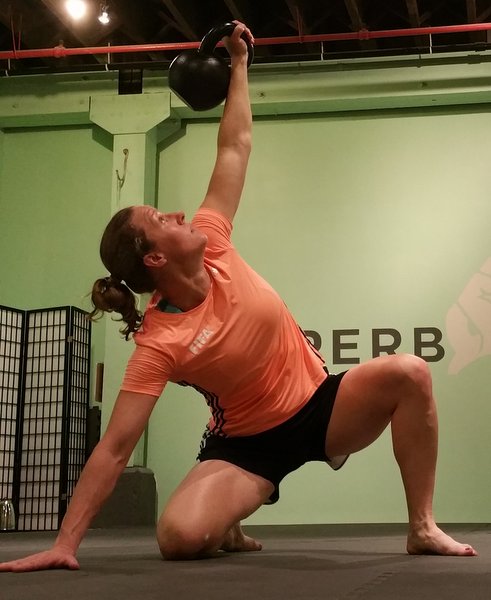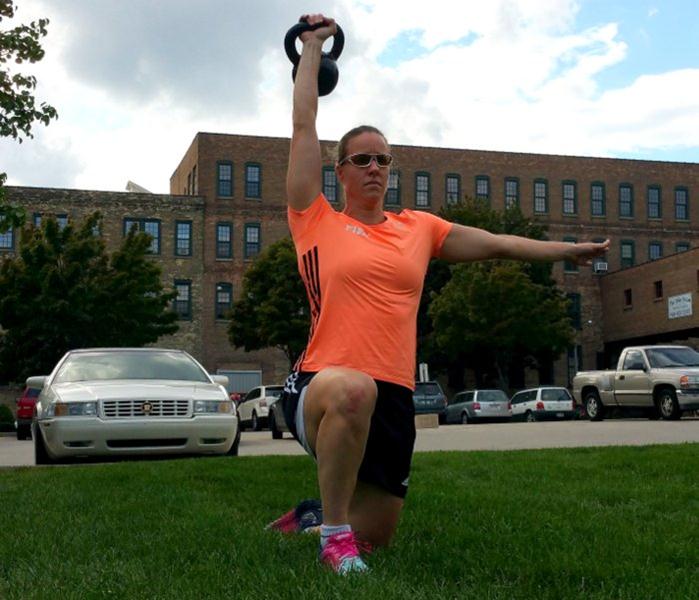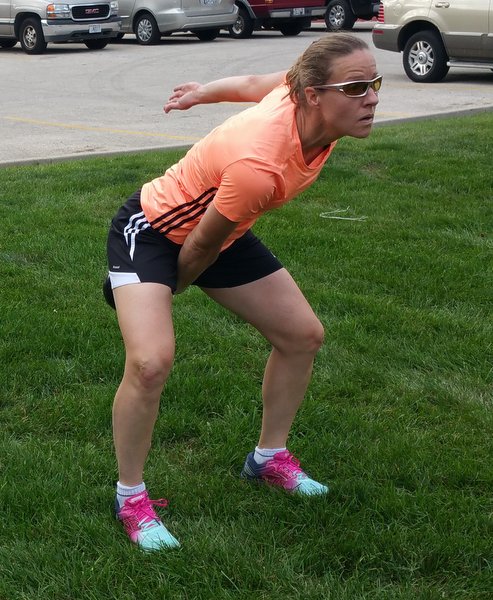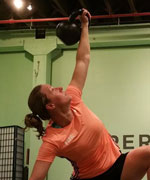How a World Cup Soccer Referee Benefits from Kettlebells, Margaret Domka Interview
By Adrienne Harvey, SrPCC, RKC-II, CK-FMS

Dragon Door: How did you first get involved with athletics?
Margaret Domka: When I was a kid, I always loved being active and involved with many different sports. I started playing soccer when I was about three and a half or four years old—I was pretty young! So, I was really involved with soccer all through my childhood, high school, and college. I started refereeing as a summer job when I was thirteen. I wanted to make some money without having a traditional job, and picked it up. By refereeing soccer I was essentially able to make my own schedule, and that’s how it all began!
Dragon Door: What led you to kettlebell training?
Margaret Domka: I found kettlebells because I was hoping to make it to the World Cup. I needed a way to keep getting stronger while also increasing my speed. I was really looking for a type of strength training that would also be functional for the goals of a referee. I also needed speed and endurance to last through a 90 minute game. So while looking through different philosophies and types of strength training I found
kettlebell training about two years ago.
Dragon Door: Do you have a favorite workout?
Margaret Domka: Anything that gets me sweaty and working hard. At the end of a workout I like to feel like I really accomplished something. While I like swings the most, I don’t know if I have a favorite specific workout—but I always want it to be intense.
I love kettlebell training, it's very fun and rewarding. I know that it has absolutely helped me as an athlete. I’m now much more prepared for everything—I feel stronger and better about myself. Everything from my running to my mentality has improved. One thing about kettlebell training that’s especially good for me about is that I don’t stress out about how I will get a good, solid, challenging workout. Every time I work with the
kettlebells, I know that's going to happen. And it doesn't take an incredibly long workout for that effect. I can get in a good workout in a pretty decent amount of time. Because it is high intensity, it also doesn’t have to be so overwhelmingly strenuous either. I can get a lot out of my training, but don’t walk away afterwards feeling mentally fatigued. I’m not just pounding my body with a workout, I’m doing effective repetitions instead.
Dragon Door: What are some of the specific physical demands of a high level referee?
Margaret Domka: Our soccer games are 90 minutes long, and we need to have many different types of fitness during that time. Obviously we need the endurance to last that full 90 minutes, but we also need to keep up with the players so that we can see what they're doing. And we need a lot of agility as well because there's many changes of direction in the game and we always have to be out of the way.
Dragon Door: Sounds as demanding as playing the game!
Margaret Domka: Absolutely. We need to be just as fit as the players. When the players take off down the field, I have to keep up with them so I can see everything that happens.
Dragon Door: Would you recommend kettlebells to other soccer referees?
Margaret Domka: I absolutely recommend them. I think kettlebell training has done a great deal for me, especially in the functional fitness side of things. And while I am not aiming to get bigger, bulkier, or just stronger for the sake of adding strength, the strength is actually carrying over into what I do. So, my running technique has improved as a result of kettlebell training because my whole body has to be aligned to correctly train with kettlebells. That just carries over so nicely to my running and sprinting.
Dragon Door: What kind of strength exercises are you doing?
Margaret Domka: I am doing a lot of different things with the kettlebells including swings and Turkish get-ups. I also work with
sandbags a little bit, and do pull ups along with a large variety of other drills.
Nick Lynch is my coach and he plans a variety of activities that train for maximum strength, conditioning, and functional movements.

Dragon Door: And you recently returned from the Women’s World Cup in Canada, what can you tell us about that experience?
Margaret Domka: Yes, I was in Canada for the 2015 Women's World Cup tournament. It lasted for six weeks, so I went at the end of May and came home at the end of June. It was an absolutely amazing experience. First of all before I even left, it was a defining moment just to be selected for such an event. I was the only American selected to attend and participate at this tournament as a referee, so it was a huge honor. I was on the field with the best players in the world, so to be the only person selected from my country was huge.
And it was fantastic just to be there, the feeling of excitement of getting on the field with those international teams who also made it to the pinnacle of the World Cup. It only happens once every four years so its also phenomenal for the teams to be there. Stepping on to the field, you could feel the energy of the stadium. It was awesome.
Dragon Door: What is the selection process for World Cup referees?
Margaret Domka: It's a long process! In 2013, there was a preliminary seminar for referees who they were watching and considering for the 2015 World Cup. So, that was a full two years ago, but even before I was selected to be in the initial group at that event, they had been looking at me for a few years before. So I had been involved at many different games, while being observed and critiqued by different assessors. There's also a lot of fitness testing involved, written tests, and video tests where you watch video clips and have to make decisions quickly just like in a game. There’s actually a wide variety of performance tests and off-the-field classroom training, too.
Dragon Door: What types of physical tests are involved?
Margaret Domka: We have tests on the track running different intervals, and we also have sprint tests. On the field we have running activities which are also intervals, and they keep getting faster and faster—those are called beat tests or yo-yo tests. I’m sure many people here have heard of those! We also do strength tests as well.
Dragon Door: So, now that you’ve refereed for the Women's World Cup, what’s your next goal?
 Margaret Domka:
Margaret Domka: Well, next year is the Summer Olympics, so it would be phenomenal to be selected for that, but it's a whole new process. Everything starts over—even if you’ve been to one tournament, you’re not automatically selected for the next one. So, I have to start the whole process over again and hope that I get to do it! That's the next thing on my checklist.
Dragon Door: I saw that you also teach high school, are you doing any coaching there as well?
Margaret Domka: When I first started working at my high school teaching Spanish, I volunteered to help the soccer teams there. But now my refereeing is so time consuming that I have to be completely committed to it at this point in my career. But I absolutely loved working with the students outside the classroom which is usually a whole different side of them. Hopefully I'll get a chance to go back and do that again eventually.
Dragon Door: It sounds like you definitely have a packed schedule, do you have some strategies for making the most of your time, your workouts, and staying healthy?
Margaret Domka: Yes. Though it’s truly difficult to fit everything in. On most days I try to do two different types of workouts a day. Usually, one is for strength and one is focused on running or something like that. Plus, I always have other, off the field homework for soccer as well—studying the game, studying video clips, and different things like that. So, it's not easy to fit it all in. I just have to be very disciplined about my schedule. I always plan out my weeks along with when and where I'll be doing my training each day. Then I have to be very dedicated to actually sticking to my plan.
When my alarm goes off at four in the morning, I know I have to get up because if I don’t, then I won’t get my workout done on that day. I have also learned how to plan ahead better. I pack my lunches and my bag the day before, so when I do have to roll out of bed at four o’ clock there's no excuses—I get up and everything is ready to go. I just throw on my clothes and walk out the door. It’s just really planning and sticking to the schedule.
 Margaret Domka refereed at the 2015 Women's World Cup, and trains in Milwaukee, Wisconsin.
Margaret Domka refereed at the 2015 Women's World Cup, and trains in Milwaukee, Wisconsin.
Back